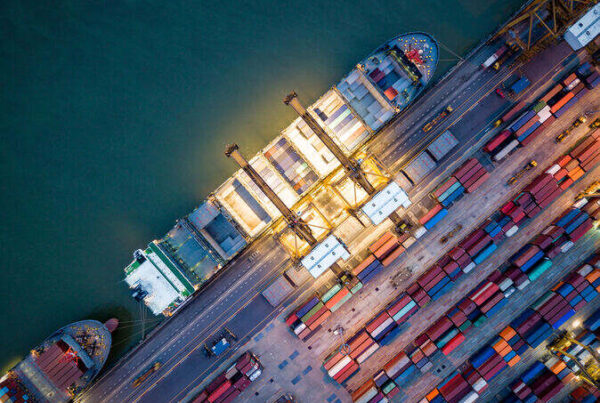International supply chains are traversed by millions of packages on a daily basis, guided through artificial intelligence (AI). Companies like Amazon and UPS employ AI software to translate data, predict customer demands, and make logistics processes efficient. With heightened supply chain disruptions caused by trade agreements, global warming, and economic restructuring, companies need to invest in supply chain solutions if they are to remain competitive.
AI is transforming supply chain management, allowing logistics companies to make their operations more efficient, minimize operating costs, and attain supply chain resilience. From demand forecasting to warehouse operations, AI-enabled logistics networks boost supply chain transparency and reduce transit times by handling vast amounts of logistics data in real time.
Route Optimization & Freight Movement
Supply chain operations with artificial intelligence have revolutionized freight movement, with real-time data being used to find the best route for delivery. AI applications consider traffic, availability of resources, and weather conditions to optimize transit time and reduce costs. UPS employs AI-driven supply chain planners to minimize fuel consumption while maximizing delivery dependability.
Apart from route optimization, machine learning enables enhanced freight movement by synchronizing transportation schedules and inventory of the supply chain partners. Supply chain planning is optimized with AI-based warehouse management software to remove bottlenecks and ensure the efficient delivery of finished goods to customers.
Logistics companies can become efficient, minimize operating expenses, and create supply chains that are resilient to adapt to variability-induced disruptions in the market with the help of AI.
Demand Forecasting & Supply Chain Resilience
One of the most significant benefits of AI in logistics is its ability to predict when it comes to demand forecasting. With massive volumes of logistics data, AI-driven systems allow supply chain managers to attain maximum inventory and order purchase levels based on real-time movement in customer demand.
Growing digital twins and generative AI allow supply chain experts to simulate various business models, forecast disruptions caused by economic shifts, and maximize mitigation strategies before issues impact operations. For instance, IBM has launched AI solutions that allow businesses to predict peak demand, reducing stock shortages and overstocking.
Artificial intelligence in supply chain management also provides safety for workers by keeping track of conditions on the factory floor and making optimal allocation decisions for personal protective equipment (PPE). AI balances automation and human involvement in supply chain processes.
Freight Matching & Logistics Efficiency
Artificial intelligence-powered platforms are transforming logistics operations by automating freight matching, ensuring supply chain partners are effectively connected. AI reduces empty miles and optimizes business models using its proprietary data sets alongside available ones to increase overall supply chain visibility.
AI logistics platforms possess special benefits, such as lower operating costs, improved scheduling, and optimized inventory strategies. AI algorithms are used by supply chain planners in making real-time corrections to data, optimizing routes, and improving decision-making.
Benefits of AI in Logistics
Numerous advantages AI presents to supply chains include:
-
Supply chain resilience: AI helps in developing supply chains with resilience through disruption anticipation in supply chains and the enhancement of mitigation measures.
-
Improved efficiency: AI optimizes levels of inventory, reduces the expense of conducting business, and improves response time in logistics.
-
Reduced costs: AI-powered warehouse management reduces excess complexity in storage space, lessens unnecessary waste, and enables finished goods to move continuously.
-
Sustainability: AI reduces carbon emissions with lowered fuel consumption and optimized routes using real-time data.
Organizations are able to provide more intelligent supply chain solutions and intelligent logistics management by implementing AI into their plans.
Challenges & Considerations
Although it has many advantages, AI for supply chain management is linked with multiple forms of challenges:
-
Data Quality: AI algorithms require massive volumes of structured sets of data to provide sound decision-making inputs. Poor-quality logistics data can lead to subpar supply chain planning.
-
Workforce Adaptation: AI automation abolishes manual labor but necessitates security mechanisms for employees and the establishment of new skills among supply chain employees.
-
Ethical Concerns: Companies must see to it that AI-driven logistics operations align with ethical standards, protecting supply chain stakeholders from the abuse of data or discrimination.
Supply chain managers shall have to implement AI in such a manner as to maximize human monitoring, trade agreements, and adherence to regulations.
The Future of AI in Supply Chains
The AI supply chain management of the future is driven by advancements in digital twins, generative AI, and other upcoming technologies that increase decision-making capabilities. These technologies will continue to advance supply chain solutions, improving the flexibility of global supply chains to adapt to market trends and climate change imperatives.
AI-driven supply chain planners will enhance supply chain resilience, using predictive intelligence to pre-emptively make changes to inventory plans, reduce operating costs, and meet business needs with precision.
Conclusion
Artificial intelligence is transforming supply chain management, allowing logistics firms to enhance efficiency, simplify logistics operations, and preemptively mitigate supply chain disruptions. Supply chain solutions, based on real-time data, improve freight movement, strengthen warehouse management, and improve supply chain visibility.
With advancing AI technology, its importance in supply chain operations will grow. Supply chain professionals who embrace AI-powered solutions will build resilient supply chains that are market-responsive, as well as sustainable logistics networks.
Through the integration of AI and supply chain planning, companies can make their logistics processes more resilient and possess a future-proof supply chain that endures in an increasingly dynamic environment.









